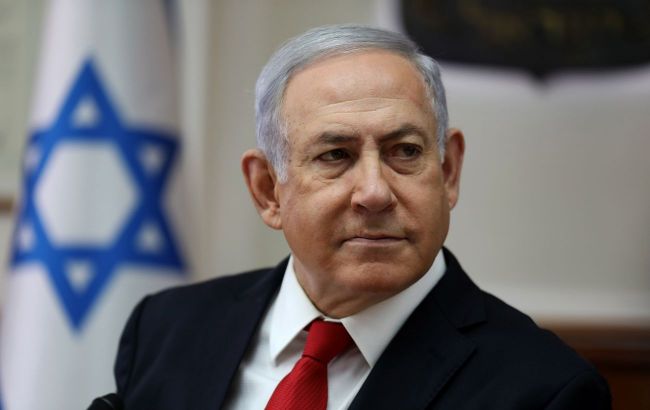Why Netanyahu disbands war cabinet and how it will affect Israel's war with Hamas
 Photo: Israeli Prime Minister Benjamin Netanyahu dissolved the war cabinet (Getty Images)
Photo: Israeli Prime Minister Benjamin Netanyahu dissolved the war cabinet (Getty Images)
Israeli Prime Minister Benjamin Netanyahu has disbanded the coalition war cabinet formed in October 2023 in response to the Swords of Iron war against Hamas.
RBC-Ukraine analyzed the reasons for the dissolution and its consequences.
Contents
- Why did Netanyahu disbands the war cabinet
- How military decisions will be made in Israel
- Demarche of Gantz and his supporters does not yet threaten Netanyahu's position
Why did Netanyahu dissolve the war cabinet
Netanyahu announced the dissolution of the war cabinet the day before at the National Security Council. Essentially, it had ceased to function last week following the departure of Benny Gantz, leader of the opposition party National Unity. Today, this was confirmed by the Prime Minister's office.
The creation of the war cabinet was a key demand of Gantz (a former Defense Minister and IDF Chief of Staff), who, along with four supporters, joined the emergency unity government. In addition to Gantz, the cabinet included Netanyahu himself, Defense Minister Yoav Gallant, ministers Gadi Eisenkot and Ron Dermer, as well as Aryeh Deri, leader of the religious Shas party.
Within this framework, operational decisions were made in campaigns against Hamas and the Lebanese Hezbollah. Now, with the emergency unity government no longer in place, the cabinet is no longer relevant, writes The Times of Israel.
Not only Gantz but also the second representative of the State Camp alliance, Eisenkot (also a former Chief of Staff), left the cabinet, explains political expert and former Israeli ambassador to Russia, Arkady Mil-Man.
According to him, the format of six members was optimal for making military decisions. Although opposition members Gantz and Eisenkot did not agree with all the decisions, the cabinet generally worked effectively.
"With the departure of Gantz and Eisenkot, there was serious pressure from Itamar Ben-Gvir and Bezalel Smotrich—ministers of national security and finance, representing right-wing forces. Netanyahu did not want to include them in the cabinet. These individuals are moving in a direction that he probably isn't interested in. Therefore, he decided to dissolve the war cabinet," Mil-Man said in a comment to RBC-Ukraine.
Despite its effectiveness, the forum was a source of disagreements, including issues regarding hostages held in the Gaza Strip by Hamas and other groups, notes The Guardian.
Last week, coalition partners Ben-Gvir and Smotrich demanded seats in the war cabinet. According to Ben-Gvir, Gantz and Eisenkot had allegedly been "putting a spoke in the wheels of the war machine" over the past few months. Netanyahu refused and, to avoid further pressure, decided to bring the issue to an end.
How military decisions will be made in Israel
Under the current law, all decisions related to military actions are made and approved by the expanded military-political cabinet. This cabinet can include up to 50 members, including ministers, aides, heads of security agencies, and relevant experts. Meetings often last for hours and frequently involve off-topic disputes.
The six-person war cabinet was empowered to make tactical and operational decisions. Strategic issues were handled at the level of the expanded cabinet, but in practice, everything related to war shifted to the war cabinet.
After Gantz and Eisenkot left, it convened only for phone consultations. The cabinet will no longer exist in its previous form, but something similar is likely to emerge.
"Effectively, the format remains Netanyahu plus three ministers. Possibly, individuals with military authority, such as those from internal security (Shin Bet) or Mossad, army generals, and others, will be invited. This is now called a consultation forum, and two meetings have already been held. The body operates in a slightly different format and under a different name," Mil-Man explained in an interview with RBC-Ukraine.
Israeli media reports that the name mitbakhon, referring to a forum from the time of Prime Minister Golda Meir, is being considered. Currently, Netanyahu consults with Gallant, Deri, Dermer, and National Security Council head Tzachi Hanegbi. It is also possible that Foreign Minister Israel Katz will join.
According to Mil-Man, the decision-making process is unlikely to change much. The main idea remains - operational decisions can be made within narrow frameworks where real military affairs are dealt with, rather than politics.
"As for the expanded cabinet, difficulties with political decisions will continue because there are those in the government who adhere to hawkish policies. Not everyone there understands how to conduct military affairs," added the diplomat.
The National Security Council will meet more frequently, and the Prime Minister will hold special consultations as needed. Most observers see this step as Netanyahu's strategy to limit the influence of right-wing politicians. Previously, he refrained from sharing certain confidential information with the NSC, fearing leaks, and it is unknown how Ben-Gvir and Smotrich would act in this regard, writes The Jerusalem Post.
Demarche of Gantz and his supporters does not yet threaten Netanyahu's position
"He still has a majority in the Knesset, the coalition exists, so in my view, it's not a political crisis," Mil-Man believes.
Although there are preconditions for new elections. The government is not coping with its duties, which it admits itself, though not openly. And according to all polls, two-thirds of Israelis want new elections. Another thing is that the government doesn't want to resign, he added.
As for the disagreements with the military leadership, the problem is that the army needs to understand the ultimate goal of the operation in the Gaza sector.
"You could say Netanyahu is stalling and not making the decisions he should have made long ago," explained the diplomat.
It's worth noting that at the end of May, US President Joe Biden presented a plan for a ceasefire and hostage release. It involves three stages of de-escalation, including a permanent ceasefire and gradual withdrawal of Israeli forces.
Netanyahu had allowed a 42-day halt to the war for hostage release. But a complete ceasefire would only come after the elimination of Hamas and removing threats from the Gaza sector. Benny Gantz criticized him for the lack of a clear vision, and ministers from the right wing threatened to break the coalition if he agreed to Biden's plan.
Milman emphasizes that Biden voiced proposals from the Israeli government to Hamas. According to the government's statement, the terrorists rejected them. However, according to participants in the negotiations, Hamas put forward conditions that Israel considered unacceptable.
"At the moment, everything is in such a frozen, sluggish state. Details are unknown. It's not talked about much, not written about much. There are some leaks, and from the reactions of the parties involved, we understand that at least the mediators are trying to continue the peace process," the diplomat said.
According to him, it's unknown what is happening in the negotiations behind closed doors. But it's already clear that completely destroying Hamas is impossible.
"You can destroy military infrastructure, a certain number of terrorists, but reaching every last Hamas member is impossible. The process is closed, which creates problems; the army needs clear instructions on what to do. Whether to hold territory or not, who will deal with the civilian population, and so on. The government is not making decisions yet. It's a problem, and no one knows when it will be resolved," Milman added.
Sources: material from The Times of Israel, Jerusalem Post, Ynet, The Guardian, and comments from political expert and former Israeli Ambassador to Russia, Arkady Mil-Man.

